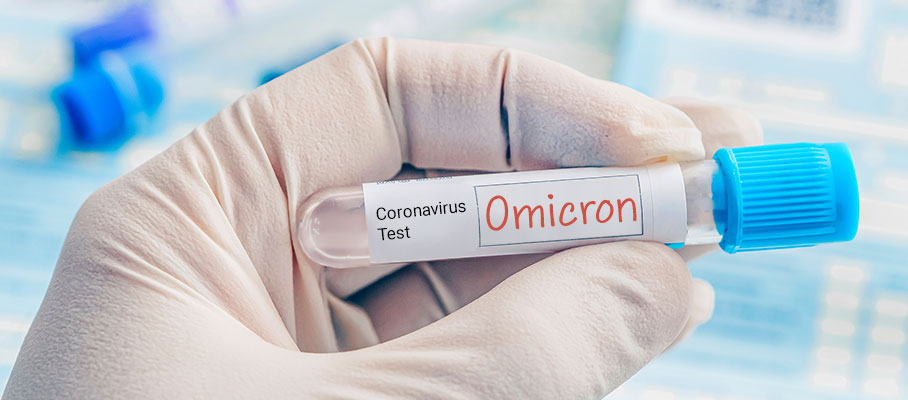Health Wellness
Omicron: What are the Symptoms, can it Evade Testing or Outsmart Vaccines? Get Your Answers here!

Table of Contents
Life in India has returned to near normalcy in the wake of low case counts and a steady vaccine drive. The country has been recording fewer than 10,000 new cases daily and has vaccinated nearly 80% of the 940 million eligible adults with at least one dose so far.
But yet another variant of the deadly coronavirus, found recently in parts of South Africa, has got the World into a frenzy again. With cities and states again posing stricter guidelines, halting the daily routine of the citizens, masks and sanitization are back in action. This new variant is termed as the Omicron, also tagged as B.1.1.529 and the World Health Organization has termed this as “variant of concern”. With the first case coming on 24th November, much research is still going on, with this virus, in order to understand it, and towards finding out its remedial measures, because the virus is said to have a large number of mutations, and thus the whole country is in fear of this new variant. With increasing cases in South Africa, the transmissibility is still yet to be confirmed, whether it is easily spread or whether the cases are due to the already prevalent virus categories. Studies are being conducted to get better data on the transmissible details from different sources.
Here’s some important information you need to know about the new Covid variant called Omicron
Omicron is the 13th variant and the latest of five 'variants of concern'. The five current variants of concern include:
Alpha – B.1.1.7 – first detected in the UK
Beta – B.1.351 – first detected in South Africa
Gamma – P.1 – first detected in Brazil
Delta – B.1.617.2 – first detected in India
Omicron – B.1.1.529 – first detected in South Africa
Is the new variant a cause of grave concern?
The new variant is said to be heavily mutated; more than 30 mutations on the spike protein. According to researchers, this level of mutation has most likely come from immunocompromised individuals. The biggest concern that researchers have is that this virus is now radically different from the original one that emerged in Wuhan, China. We are yet to gather data on whether this variant could evade vaccine or natural immunity or have higher transmissibility. Having several mutations does not mean that the virus will be deadlier or more dangerous. Nevertheless, every variant would have the potential to impact the pandemic.
Omicron symptoms: What to look out for?
Though there are still studies and extensive research underway to find out if the symptoms associated with Omicron are any different from the earlier variants, and if so what are these new symptoms. Understanding these and the level of severity these have, might take some time, till then prevention is our only key solution. While the most common indicators remain fever, cough, excessive exhaustion and body aches, some also include breathlessness, chest pain, appetite loss, headaches, itchy throat etc. Some experts have suggested that Omicron may not cause much cold-like symptoms as in the Delta variant. Though cases have been mild and not reported any deaths, it still is not clear if Omicron will be as severe in comparison.
Do not delay COVID testing if you get to notice any symptoms. The virus is still there and we need to be cautious. Book your RT-PCR here.
Does the Omicron variant spread faster than the Delta variant? Can it cause a third wave too?
It has been seen that the Omicron can spread faster than the previous Delta variants but enough data is not available to confirm this. The emergence of a new possibly more infectious variant has also raised the spectre of a third wave - a frightening prospect given how the second wave devastated India in the months of April and May as hospitals ran out of beds, oxygen and medicines. We need to be vigilant about the situation and watch out for our actions.
Is the current RT-PCR test effective?
As for the PCR tests that are being done, these continue to be able to detect this new infection just like the previous ones. In fact, unlike other variants, the RT-PCR test shall be able to give clues about Omicron infection even before genome sequencing.
Do not ignore testing if you see any unusual symptoms and have an international travel history. Get tested with Metropolis.
Are the existing vaccines effective?
Initial evidence suggests Omicron has a higher re-infection risk and can infect fully vaccinated people too. Though all the current vaccines remain effective against the severe disease, WHO is still finding whether the already existing measures are enough to tackle this new virus in reducing its severity and preventing death. Scientists say it will take another three weeks to know how the heavily mutated variant impacts the effectiveness of various vaccinations. Meanwhile, do complete your vaccination doses to stay safe.
Prevention and treatment
As more and more information is emerging from various researches that are going on, individuals are again reminded of the same old measures like wearing masks in public or crowded places, regularly washing hands, maintaining a safe distance and practising social distancing wherever possible, having proper ventilation in the houses or any other indoor space and most importantly getting vaccinated.
Countries and states have been on their toes again with the invent of this concerning virus, they fear the same situation might arise, where there might be a shortage of beds in the hospitals, oxygen plants have to be arranged in emergency and vaccine supply will be hit hard at the peak. In order to avoid that, the government has already started preparing themselves for what is yet to come. Enhancing surveillance, tracking cases and contacts, sharing data with the concerned authority to help them with their research for better medicinal treatments etc. are some of the recommended actions that responsible countries should take. As a precautionary move, the UN body has told the Asia Pacific Nations to brace for virus surge and focus on boosting vaccination numbers. Preliminary study from South Africa, the country where it merged, suggests that Omicron might have 3 times reinfection risks as compared to the Delta or Beta variants and also losing a layer of defence, the researchers said, a past Covid infection might give little immunity to the new Omicron variant.
As we continue to fight this new variant, the first thing is to stay calm, getting yourself vaccinated, cooperating with the officials to get both doses of the vaccine, as the mutations may decrease efficacy but these jabs are sure to protect us against the severity of the virus. The WHO says Omicron could displace the Delta variant, and as studies keep evolving, prevention and precaution are better than cure at the moment. Stay safe and stay protected.
References-
https://www.who.int/news/item/26-11-2021-classification-of-omicron-(b.1.1.529)-sars-cov-2-variant-of-concern
https://www.who.int/news/item/28-11-2021-update-on-omicron
FAQs on Omicron. MoHFW





































